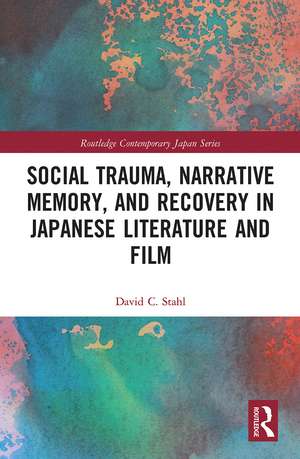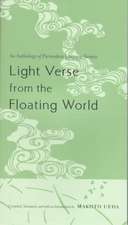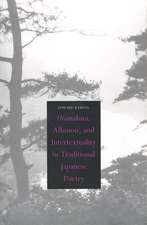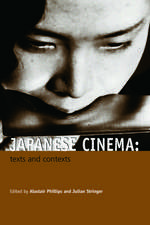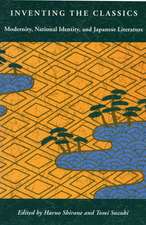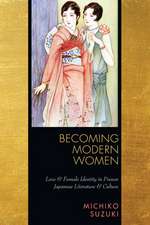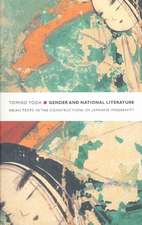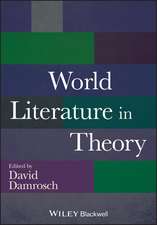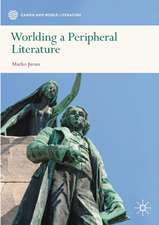Social Trauma, Narrative Memory, and Recovery in Japanese Literature and Film: Routledge Contemporary Japan Series
Autor David Stahlen Limba Engleză Paperback – 31 mar 2021
This book provides a comprehensive analysis of major works in Japanese literature and film through the interpretive lens of trauma and PTSD studies. Focusing critical attention on the psychodynamics and enduring psychosocial aftereffects of social trauma, it also evaluates the themes of dissociation, failed mourning, and psychological defence fantasies.
Building on earlier studies, this book emphasizes the role of protagonists in managing to effect partial recovery by composing memoirs in which they transform dissociated traumatic memory into articulate, narrative memory or bring about advanced recovery by pioneering alternative means of orally communicating, working through, and overcoming debilitating personal histories of traumatization and victimization. In so doing, Stahl also demonstrates that what holds true on the individual and microcosmic level, also does so on the collective and macrocosmic level.
This new critical approach sheds important new light on canonical Japanese novels and films and enables recognition and appreciation of integral psychosocial aspects of these traumatic narratives. As such, the book will be of huge interest to students and scholars of Japanese film and literature, as well as those of trauma studies.
| Toate formatele și edițiile | Preț | Express |
|---|---|---|
| Paperback (1) | 391.81 lei 6-8 săpt. | |
| Taylor & Francis – 31 mar 2021 | 391.81 lei 6-8 săpt. | |
| Hardback (1) | 765.43 lei 6-8 săpt. | |
| Taylor & Francis – 19 iul 2019 | 765.43 lei 6-8 săpt. |
Din seria Routledge Contemporary Japan Series
-
 Preț: 311.18 lei
Preț: 311.18 lei - 8%
 Preț: 383.06 lei
Preț: 383.06 lei -
 Preț: 325.09 lei
Preț: 325.09 lei - 9%
 Preț: 934.96 lei
Preț: 934.96 lei -
 Preț: 348.51 lei
Preț: 348.51 lei -
 Preț: 340.61 lei
Preț: 340.61 lei -
 Preț: 327.41 lei
Preț: 327.41 lei -
 Preț: 309.55 lei
Preț: 309.55 lei -
 Preț: 309.93 lei
Preț: 309.93 lei -
 Preț: 202.94 lei
Preț: 202.94 lei -
 Preț: 310.99 lei
Preț: 310.99 lei -
 Preț: 663.95 lei
Preț: 663.95 lei - 14%
 Preț: 1002.06 lei
Preț: 1002.06 lei - 18%
 Preț: 1056.00 lei
Preț: 1056.00 lei - 18%
 Preț: 1061.93 lei
Preț: 1061.93 lei -
 Preț: 348.40 lei
Preț: 348.40 lei -
 Preț: 483.08 lei
Preț: 483.08 lei -
 Preț: 484.04 lei
Preț: 484.04 lei - 28%
 Preț: 820.32 lei
Preț: 820.32 lei - 23%
 Preț: 327.08 lei
Preț: 327.08 lei - 18%
 Preț: 1162.39 lei
Preț: 1162.39 lei - 18%
 Preț: 951.96 lei
Preț: 951.96 lei -
 Preț: 290.77 lei
Preț: 290.77 lei - 25%
 Preț: 823.99 lei
Preț: 823.99 lei - 18%
 Preț: 703.79 lei
Preț: 703.79 lei - 18%
 Preț: 1051.60 lei
Preț: 1051.60 lei - 18%
 Preț: 1059.84 lei
Preț: 1059.84 lei -
 Preț: 390.96 lei
Preț: 390.96 lei - 18%
 Preț: 1110.92 lei
Preț: 1110.92 lei - 18%
 Preț: 1220.42 lei
Preț: 1220.42 lei -
 Preț: 277.04 lei
Preț: 277.04 lei - 28%
 Preț: 791.43 lei
Preț: 791.43 lei -
 Preț: 447.51 lei
Preț: 447.51 lei -
 Preț: 487.44 lei
Preț: 487.44 lei -
 Preț: 328.95 lei
Preț: 328.95 lei - 18%
 Preț: 1113.95 lei
Preț: 1113.95 lei - 18%
 Preț: 1058.79 lei
Preț: 1058.79 lei - 24%
 Preț: 129.96 lei
Preț: 129.96 lei - 18%
 Preț: 1007.48 lei
Preț: 1007.48 lei - 28%
 Preț: 818.93 lei
Preț: 818.93 lei - 18%
 Preț: 1059.84 lei
Preț: 1059.84 lei -
 Preț: 386.30 lei
Preț: 386.30 lei - 18%
 Preț: 1056.95 lei
Preț: 1056.95 lei
Preț: 391.81 lei
Nou
74.97€ • 78.56$ • 61.98£
Carte tipărită la comandă
Livrare economică 11-25 aprilie
Specificații
ISBN-10: 0367785439
Pagini: 274
Dimensiuni: 156 x 234 x 15 mm
Greutate: 0.51 kg
Ediția:1
Editura: Taylor & Francis
Colecția Routledge
Seria Routledge Contemporary Japan Series
Locul publicării:Oxford, United Kingdom
Public țintă
Postgraduate and UndergraduateCuprins
Notă biografică
Descriere
This book provides a comprehensive analysis of major works in Japanese literature and film through the interpretive lens of trauma and PTSD studies. Focusing critical attention on the psychodynamics and enduring psychosocial aftereffects of social trauma, it also evaluates the themes of dissociation, failed mourning, and psychological defence fantasies.
Building on earlier studies, this book emphasizes the role of protagonists in managing to effect partial recovery by composing memoirs in which they transform dissociated traumatic memory into articulate, narrative memory or bring about advanced recovery by pioneering alternative means of orally communicating, working through, and overcoming debilitating personal histories of traumatization and victimization. In so doing, Stahl also demonstrates that what holds true on the individual and microcosmic level, also does so on the collective and macrocosmic level.
This new critical approach sheds important new light on canonical Japanese novels and films and enables recognition and appreciation of integral psychosocial aspects of these traumatic narratives. As such, the book will be of huge interest to students and scholars of Japanese film and literature, as well as those of trauma studies.
